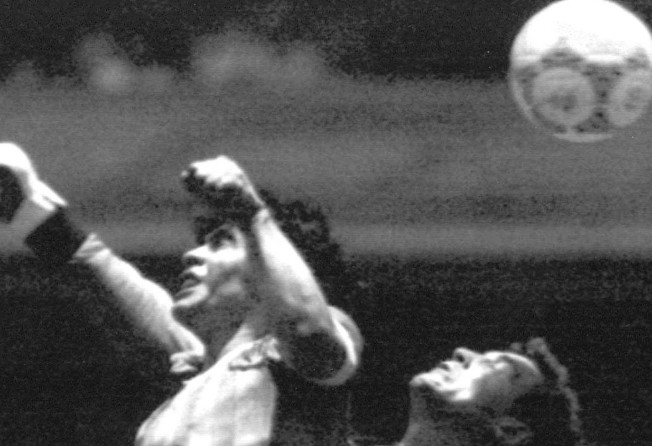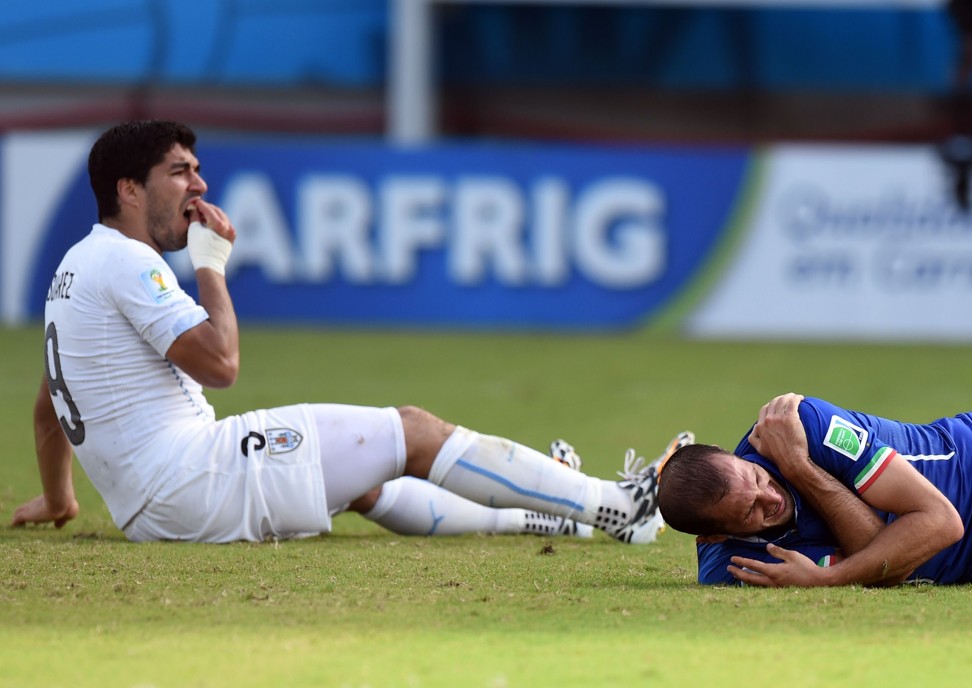How footballers cheat: Hong Kong referee dishes dirt on dark arts of the game in new book
Local academic William Lai’s new book lists every trick and tactic used by top level pros and kids alike, as he hopes to educate officials and players against being conned

Football fans are filled with opinions and never more so when there is controversy. Take Diego Maradona’s “Hand of God” goal against England at the 1986 World Cup. Some people, including England’s captain in that game, Terry Butcher, think of El Diego as a cheat. Others say it was revenge for the Falklands War. Others still point to the player’s other goal in the same game, one regarded by many as the best of all time.
Mark Sutcliffe, chairman of the Hong Kong Football Association, argues the goal should be called “Hand of Devil” which he writes in the foreword for local referee and academic William Lai’s new book, Football Dark Arts: Every Crafty Soccer Trick In The Book.
Aguero and others copy the “Hand of God”
With hundreds of examples, Lai’s book lives up to its subtitle. But as he is at pains to point out: “This is not a guide on how to con referees!”
Lai argues that more knowledge of the dirty tricks going on in football makes the referee’s job easier – and the players’.
“Education is the solution,” he says. “By raising awareness of the dark arts, I hope to level the playing field for everyone because their understanding of the game will improve.
“Players can choose to use them to exploit others, or to use this knowledge to avoid being exploited.”
In the “arms race” that is the modern game, as Lai puts it, every little helps. “Not everyone can have a Lionel Messi on their team to help them win matches, it is easier and cheaper to use the dark arts instead,” he writes.
Cavani gets an “oil check”
While Messi doesn’t feature in the book, many other big names do – from Marco Materazzi goading Zinedine Zidane into his infamous 2006 World Cup final headbutt, to Jose Mourinho’s extensive gallery of indiscretions, or to Giorgio Chiellini possibly exploiting Luis Suarez’s history of biting at the 2014 World Cup in Brazil.
The common thread linking these incidents? The players involved all have cabinets full of medals.

“Many players who perform dark arts are actually winners, but there is a disconnect in the way we perceive winners because this is not how civilised society teaches people how to play and how to win,” he says.
In the modern game, fair play often goes out of the window and players are taught to win at all costs.
Take the behaviour of the Juventus players in their Champions League quarter final second-leg against Real Madrid last month, when they tried to damage the penalty spot before Cristiano Ronaldo scored a decisive added-time spot kick.
The Juve players went unpunished – aside from going out of the competition – but referees can only do so much to combat the dark arts within the laws of the game.
Juventus players try to put off Cristiano Ronaldo
This is incredible. Look how many times Juventus’ players attempt to put Cristiano Ronaldo off and damage the penalty spot.
He doesn’t react until he’s running off after winning the game.pic.twitter.com/EwikM77Qpe— Jordan Clarke (@FourFourJordan) April 12, 2018
While praising English referee Mark Clattenburg for dealing with “Real Madrid dark art specialist” Pepe and for booking Keylor Navas for delaying a penalty in the 2016 Champions League final, Lai thinks it is up to the game’s governing bodies to do more, for while they remain toothless the players won’t change their ways.
“Worse still, millions of other players around the world and at all levels will copy these dark arts because they conclude that this negative behaviour is accepted and tolerated by the authorities,” he says.
Materazzi goads Zidane into headbutt
This is something that has been filtered all the way down the football pyramid from professional level to the under-10s, says Lai.
“In the main, youth coaches do a great job developing their players, letting them enjoy themselves, and instilling fair play” but there are a minority who “think they are clever by using the dark arts”.
Lai says he has seen a former pro tell his young players to feign injury and then point out the injured player to the 14-year-old junior referee to get him to stop the game and break up an opposition counter attack.
Rivaldo cons the ref
“Dark arts practitioners are just opportunists and if they get away with their exploits, they will naturally continue,” says Lai, who think this will happen “as long as there are competitive and commercially lucrative games to win”.
But he remains hopeful.
“With better understanding among all stakeholders, there can be better tolerance, better empathy, and better decision making for all,” he says.